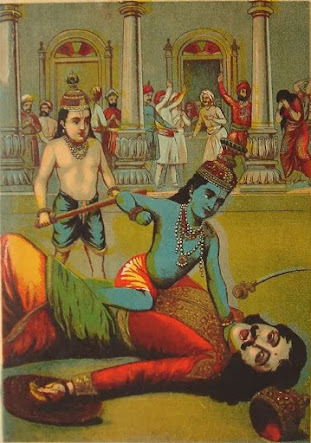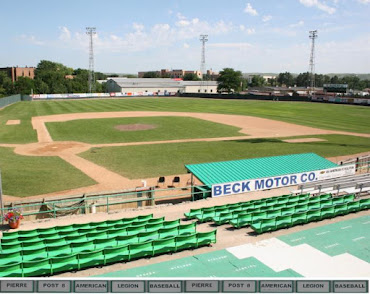Week 11 Reading A: Shri Krishna of Dwarka
CHAPTER 1. THE COMING OF KRISHNA: When the guards awoke and learnt that an eighth child had been born to Devaki, they ran to King Kansa. After receiving the prince’s salutation, Narada told him that in a former life Vasudeva and Devaki had obtained from the Lord Vishnu the boon that he would be born to them as a son, and that as their son he would, as foretold by the heavenly voice, slay Prince Kansa. But before Devaki’s seventh child was born, the Lord Vishnu caused it to be drawn from her womb and placed in the womb of Rohini, Vasudeva’s other wife who was in hiding in Gokula for fear of King Kansa. But suddenly above the blare of the horns and the booming of the drums a voice was heard in the heavens which said, “Today Kansa in his folly honours her whose eighth child will slay him.” Now Kansa the demon who especially oppressed the Earth and the human race was, as I have said, the son of Ugrasena, king of the Bhojas and of their chief city Mathura. Vasudeva, at his son’s bidding, placed him by Yashoda’s side as she slept and took in his place Yashoda’s baby girl and carried her back with him to Mathura.
CHAPTER 2. THE CHILDHOOD OF KRISHNA: When King Kansa had killed by means of his guards all the male children within his borders, he resolved to kill the male children outside his borders also. Directly life left the cruel witch, she resumed her true shape and, instead of a beautiful sweet-faced woman, she became a hideous giantess whose horrible limbs stretched far and wide outside Nanda’s cottage. But as it was ordained that they should go to Vrindavan, a great band of fierce wolves came into the woods round Gokula and began to pull down the villagers’ cattle and carry off their sheep and goats. When Prince Vasudeva learnt that Kansa was slaughtering the male children in his kingdom, he went with all haste to Nanda’s wagon and bade him flee away lest his newly born son might perish also. The divine child sucked out of her all her poisoned milk and, although Nanda and Yashoda tried to take him away, he would not let go Putana’s breast until he had sucked out her life blood as well, and she had fallen dying on the floor of Nanda’s hut. Then seeing a pot of milk boiling over on the hearth inside her house, she left Krishna and went to take the milk off the fire. He first overturned the milk which Yashoda had been churning, and then he toddled inside the house and, climbing on a pot, began to eat the butter which Yashoda had already churned and put by on a shelf. At last they came to a spot about a mile away, where they saw lying on the ground a huge giant on whose chest sat Krishna, crowing and laughing just as if he had been in his cradle. So the little boy became impatient and, putting his baby feet out of the cradle, began to press them with all his force against one of the wheels of the wagon. She took another piece of cord the same length and, tying it to the first piece, tried again; still the cord would not meet.
CHAPTER 3. BOYHOOD OF KRISHNA: “Nay,” answered Krishna, “when Garuda sees my footprints stamped on your head, he will know that I have pardoned and spared you. The slime of the great snake so poisoned the soil along the banks that all the trees save one, a Kadamba tree, died; while its foul breath filled the air with such poisonous vapor that the very birds that tried to fly over the Yamuna fell dead in her waters. Recovered from its wounds, it began to haunt the banks and devour the cattle and cowherds, who came to slake their thirst in the pool. “But,” said Kaliya, “there Garuda will seek me out and destroy me.” When Kansa heard of this fresh failure, he still did not lose heart but called to his aid two other demons, brothers of the cruel murderess Putana. Kaliya, hearing the noise, thought that some foolish herdboy was bathing in the stream and with all haste rose to the spot to devour him.
CHAPTER 4. THE YOUTH OF KRISHNA: When Krishna saw the cowherds preparing for the sacrifice, he bade them no longer sacrifice to Indra but to Govardhan mountain, a great hill, not far from Vrindavan. The rainy season slowly changed into the cold weather, and the cowherds gathered together to offer thanks and sacrifices to the God Indra for the monsoon that had passed away and their prayers to him for a good rainfall in the coming year. Seeing Dhenuka’s end, his companions also in the form of wild asses rushed together at Krishna and Balarama, but the two boys caught them one after the other by the tails or the hind legs and dashed their brains out against the fruit trees. When the cowherds had once more driven their cattle into the fields and forests, Indra descended from Amravati to earth on his elephant Airavata and, invisible to the cowherds, greeted Krishna. One day when they had reached a big fig tree known far and wide as the Bhandira fig tree, the boys pretended they were deer and began to jump, two and two together, imitating the bounds of deer. " With these words he plucked up from its roots Govardhan mountain and, holding it up high above his head, bade the cowherds take shelter beneath it. After telling this story, the Vidhyadhara walked round Krishna several times, bowed to his feet and then rose into the heavens, where he was lost to the cow-herds.
CHAPTER 4. THE MANHOOD OF KRISHNA: “We are two lads from Gokula,” said Krishna, “and we have come to try a fall with the king’s wrestlers in the great sports that the king is holding.” Covered with sweat and dust, Krishna turned to the royal throne and said, “My lord king, we are two country lads who have come from Gokula. King Kansa was so nettled at Narada’s words and at the same time so angry at his own failures to kill Krishna that he drew his sword to cut down Vasudeva, who stood not far from him. “King Kansa,” he said “why do you thus tamely await the coming of death? Krishna said to her, “Fair maid, fortunate is the king whom you serve! When Krishna heard of this monster’s coming, he at once sought it out, but it was some days before he came upon it for the giant brute loved to hide and to rush out upon the cowherds when alone and kill them. Kubja replied, “My name is Kubja, good sir, I am a serving maid of Kansa the king. King Kansa had watched with sinking heart the fight between Krishna and Kuvalyapad, and he knew that the enemy, by whose hand he was to die, stood before him. King Kansa, mad with terror, called on his other wrestlers and his soldiers to seize the two cowboys and put them in chains. On the day fixed for the passage of arms, the sun rose bright and clear, and the two lads mounted Akrura’s chariot and drove with him to the outskirts of Mathura. “Yes, surely,” answered Kubja. At the some time the mahout of Kuvalyapad, a man-slaying elephant, should keep his elephant at the door of the arena and, when a chance offered, set it on the youths and trample them under foot. Just inside the town gates they saw one Rajak, King Kansa’s washerman. Instantly the mahout drove his goad into Kuvalyapad’s head, and it rushed with lowered tusks at Krishna. Krishna grew wroth at the man’s words and manner and struck him a blow in the face with his open hand.
CHAPTER 6. Krishna Founds Dwarka: King Ugrasena and Balarama assented and, gathering together the men of Mathura, they left it and journeyed to the shores of the western sea and there began to build a mighty city. When Krishna heard these evil tidings and saw how few were left of the men of Mathura, he said to King Ugrasena and Balarama, "It is ill staying here. Now King Kansa had married the princesses Asti and Prapti, the two daughters of Jarasandha, the great and wicked king of Magadha. But when Varuna the sea god learnt why they had come, he pleaded that not he but a demon named Panchajanya had seized Sandipani's son and had dragged him under the water and was keeping him captive in a giant shell at the bottom of the sea. Because of the king's fear of the rishi, the king's daughter Sarmishta quarrelled with Devayani, and that very day Sarmishta, seeing Devayani standing on the brink of the well, had stolen up behind her and had pushed her in. In ancient times, my lord king, there once reigned in Mathura a great king called Nahusha. Then he called to his aid a great barbarian king called Kala-Yavana, who got ready to march with an even greater host against Mathura. The mighty rishi grew exceedingly wroth when he heard his daughter's tale, and he cursed Yayati so that, although still young, he became a decrepit old man. At last Yayati's youngest son, Puru, freely gave his father his youth and took in exchange his father's old age.
CHAPTER 7. Rukmani: He went out to meet them and, when he learnt that they had come to be present at the princess Rukmani's wedding, the old king, although he had not expected them, greeted them courteously, and the two princes at the head of their picked body of Yadava knights entered the joyful capital. When the chariot reached king Bhishmak's capital, Kundinapuri, it was holding high festival because of the princess's coming marriage. Going to the door of the inner shrine, she performed with the aid of the brahmin women all the worship due by a betrothed girl. He asked the Brahmin the day fixed for the marriage. Shishupala reluctantly left the town with such of his men as survived, and he and Jarasandha went sadly back to their own countries. But the eldest, Rukmi, envied the dazzling prince and, disregarding their counsel, led his father King Bhishmak to promise her hand to Prince Shishupala, son of Damaghosha, King of the Chedis. Rallying the men of Kundinapuri, he led them out of the city by yet another gate and began to gallop so furiously after Krishna's chariot that he outdistanced his horsemen and, in the end, found himself alone among Krishna and a band of his Yadava knights. She did not know that the old brahmin whom she had sent with a letter to Krishna had taken, because of his age, so long a time in going to Dwarka that he had had no time to return with Krishna's answer. It ran as follows:My lord prince, I have heard so much of your beauty and prowess that I can think of nothing but of you. The same evening Rukmani went out, as she had written to Krishna, to visit the shrine of the goddess Ambika. On the temple steps she stopped for a moment, looking for Krishna's chariot which, as she knew, carried aloft a banner with an eagle on it. Now there ruled over Vidarbha or Berar a great king called Bhishmak who had five sons and one lovely daughter. Thereafter Krishna, Rukmani, Balarama, and the Yadava knights went joyfully to Dwarka.
Bibliography: Shri Krishna of Dwarka and Other Stories, C. A. Kincaid, Story



Comments
Post a Comment